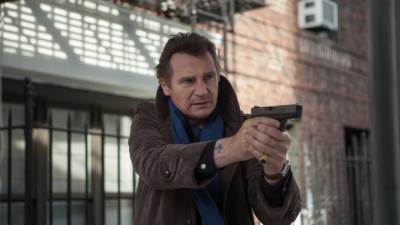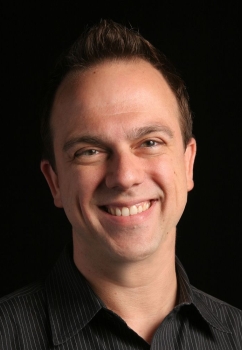
Miami’s Rivera finds real thriller in writing score for Neeson film
When the new Liam Neeson thriller, A Walk Among the Tombstones, makes its debut Friday, at least one Miami man will be watching with more than the usual interest.
That’s because Carlos Rafael Rivera wrote the score for the film, and the University of Miami lecturer found his first experience writing music for a movie to be a collaborative joy.
“It was a privilege to be the dumbest guy in the room, and get to work with the level of people I did,” Rivera wrote in an email. “The process was everything for me.”
Rivera, who lived in Kendall as a teenager and studied at Miami-Dade College and Florida International University, spent 10 years in Los Angeles earning graduate degrees and then teaching at the University of Southern California. He moved back to Miami in 2010, the year he wrote a trumpet concerto for the great Latin jazz superstar Arturo Sandoval.
A guitarist whose work includes playing on the soundtracks of Crash and TV’s Scrubs, Rivera’s connection to Scott Frank, the director of A Walk Among the Tombstones, began with a stroke of pure luck, Rivera said.
“So one day, Scott Frank walked into Old Town Music in Pasadena – looking for a guitar teacher. He opened a binder and picked my name,” Rivera wrote. “It never occurred to me that 10 years later I would be scoring a film he directed, starring Liam Neeson and Dan Stevens.”
The story of the film, based on a 1992 novel by Lawrence Block, concerns a former New York police officer named Matt Scudder who has left the force after accidentally killing a little girl while trying to stop a violent bar robbery. Now an unlicensed private detective and recovered alcoholic, he agrees to help a drug dealer find the two psychopaths who have killed his wife.
Rivera said a lot of the initial work for the music involved talking with Frank about how to portray Scudder in sound.
“We spent A LOT of time going back and forth in finding Matt Scudder’s musical voice. I remember him referring to Matt as a sad dude who’d kinda blown it, and wanting the music to reflect the weight of his redemption,” Rivera wrote. “Going back even further, one of my first sketches to his script inspired him to come up with the very moody Main Title credit sequence. However, as the music shifted in tone, I ended up rewriting the main title music, replacing what I had previously done. A truly surreal experience, but it helped tell the story the picture needed to tell.”
Rivera said it took about 30 days to write the 40 minutes of music the film calls for.
“I had written a previous version of the score as the movie was assembled, and even a first version which was written to the script. But as the film was being edited, a new shape and more importantly, tone, came to the fore, and it was becoming obvious, even with my own inexperience, that all of my previous sketches weren’t fitting anymore,” he wrote.
The tone also became important in choosing the instruments he would need for the score.
“Once I settled on choir, harp, keyboards (celeste, Wurlitzer), electric guitar, waterphone, and strings, I stuck to that instrumentation. Figuring out the choir and string recording sessions came later (and was a very instructive experience),” Rivera wrote.
He also learned a lot from making mistakes.
“The entire post-production team knew very well it was my first film, yet they all stood behind me. And I made some mistakes — pretty big ones — like editing one of the first cuts they sent me to match the music I’d written,” he wrote. “The director called me and asked if I had actually cut the picture. I said ‘Yes, isn’t it great how it fits the music?’
“That alone should’ve had me replaced. A rookie mistake — and there were plenty like that,” Rivera wrote.
Carlos Rafael Rivera.
Writing a score for a film requires a different sort of mindset than it does for writing a piece of concert music.
“It’s a very different experience where you are truly collaborating — or better yet, serving a role in helping tell a story — with other people,” he wrote. “It is a fortunate thing if the music, above aiding in the storytelling, resonates at such a level as to make a concert-style impact. It felt very different to me.
“In the performing arts, commissions come as a result of trust in what you have previously created — YOU are in command. In film making, you are definitely AT the command of the director, and little allowance is made for anything else. I actually enjoyed being asked to revise cues — it always made me dig deeper, and I was always happy with the results.”
And it helped that Rivera is a fan of the noir genre, which also drew him to the music of some of the genre’s classic cinema.
“I spent a long time watching the greats — The Maltese Falcon, Chinatown, L.A. Confidential, Laura — all to see what choices the composers were making through different eras. A true education,” he wrote, which he then passed along to his UM students in his film-scoring class, which he teaches with composer Chris Boardman, a versatile film industry composer and arranger with a vast list of credits to his name.
“The greatest part of this experience is the privilege of being able to share it with my students. Teaching has always been a priority for me,” he wrote. “Since I made the decision to be a full-time musician, I made a promise to myself to always give back, and hopefully inspire someone else to continue — and definitely improve — what I am doing.”
So the big question is: Did he get to meet Liam Neeson?
“What was interesting to me in this experience was realizing most of the post-production personnel rarely interact with cast members. I spent most of my time in a room,” Rivera wrote. “However, I was flown onto the set for an afternoon, and met Boyd Holbrook, saw Scott for one entire minute, and Liam Neeson from far away. I’ve been invited to the screening in NYC this week, and will hopefully meet Mr. Neeson and let him know about his particular set of skills.”
The early reviews of the film are largely positive, with Variety’s Andrew Barker praising Rivera’s work, saying “composer Carlos Rafael Rivera offers a score that is unexpectedly melodic, yet entirely effective.”
A Walk Among the Tombstones opens Friday; Rivera’s score came out on the Varèse Sarabande label Tuesday.
Recent Content
-
Artsarticle ·
-
Artsarticle ·
-
Artsarticle ·

